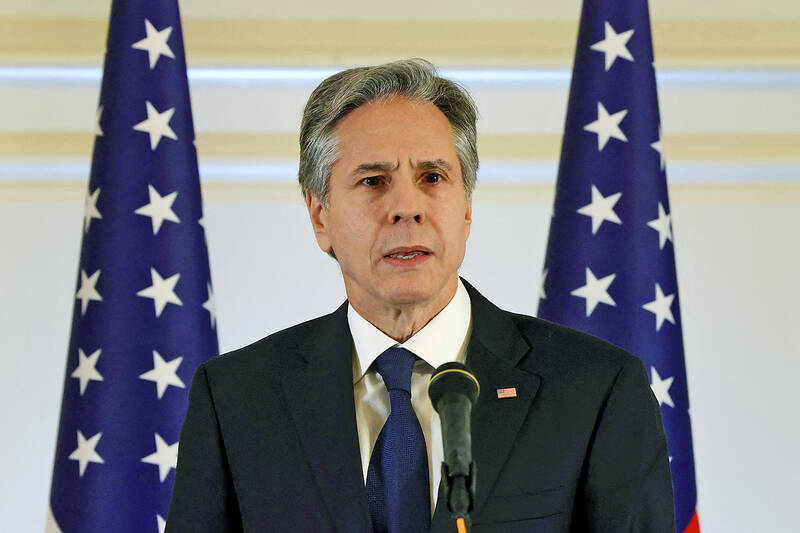Nine members of the US House of Representatives have called on US Secretary of State Antony Blinken to make a stopover in Taipei on his planned trip to Beijing tomorrow and Monday in keeping with the spirit of the Taiwan Travel Act and honor what Blinken called a “rock solid” commitment from the administration of US President Joe Biden to Taiwan.
The request was made in a joint letter signed by Republican representatives Tom Tiffany, Scott Perry, Dan Crenshaw, Andy Ogles, Burgess Owens, Nancy Mace, Scott DesJarles, Byron Donalds and Earl Carter.
The letter was sent to Blinken on Wednesday.

Photo: Reuters
If Blinken visits Taipei, it would “send a clear message that the United States strongly opposes China’s reckless military provocations in the region — actions which President Biden has described as ‘coercive’ and a threat to regional peace and stability,” the representatives said in the letter.
It would also be an opportunity for Blinken to “publicly address growing concerns about recent delays in the delivery of US weapons systems to Taiwan,” they wrote.
“Some of these systems are related to arms sales that were approved as long ago as 2019 and include everything from F-16s to other asymmetric weapons that are critical to Taiwan’s defensive capabilities,” they added.
A visit to Taiwan by Blinken would be “consistent with the congressional intent of the Taiwan Travel Act, which made it the express policy of the United States to encourage high-ranking US executive branch officials to visit Taiwan and meet with their counterparts,” they wrote.
The representatives asked Blinken to consider their request in the interest of improving bilateral ties between Taiwan and the US.
Blinken’s planned visit to China would be be the first by an incumbent US secretary of state since October 2018.
At press time yesterday however, a US official said Blinken has put off the visit to Beijing after the discovery of an alleged Chinese spy balloon in US airspace.
Separately, US House of Representatives Speaker Kevin McCarthy on Thursday said that China cannot decide where he can go, although he currently has no plans to visit Taiwan.
“I don’t think China can tell me where I can go at any place, at any time,” McCarthy told reporters at the Capitol when asked what his reaction was to China’s warning against him visiting Taiwan.
US media outlet Punchbowl News on Monday last week reported that the Pentagon was in the early stages of preparing for a trip by McCarthy to Taiwan in the spring, citing a Biden administration official with knowledge of the matter.
However, McCarthy on Thursday said that he had “nothing scheduled now on Taiwan.”
China staged several days of large-scale military exercises around Taiwan in August last year following a visit by then-US House of Representatives Speaker Nancy Pelosi’s visit to Taipei, in a move seen as retaliation for the visit.
Since then, the Chinese People’s Liberation Army has routinely breached the Taiwan Strait median line with its air force and navy. The line has traditionally served as a tacitly understood boundary.
Additional reporting by AFP
This article has been updated since it was first posted.

The Central Election Commission has amended election and recall regulations to require elected office candidates to provide proof that they have no Chinese citizenship, a Cabinet report said. The commission on Oct. 29 last year revised the Measures for the Permission of Family-based Residence, Long-term Residence and Settlement of People from the Mainland Area in the Taiwan Area (大陸地區人民在台灣地區依親居留長期居留或定居許可辦法), the Executive Yuan said in a report it submitted to the legislature for review. The revision requires Chinese citizens applying for permanent residency to submit notarial documents showing that they have lost their Chinese household record and have renounced — or have never

A magnitude 5.6 earthquake struck off the coast of Yilan County at 12:37pm today, with clear shaking felt across much of northern Taiwan. There were no immediate reports of damage. The epicenter of the quake was 16.9km east-southeast of Yilan County Hall offshore at a depth of 66.8km, Central Weather Administration (CWA) data showed. The maximum intensity registered at a 4 in Yilan County’s Nanao Township (南澳) on Taiwan’s seven-tier scale. Other parts of Yilan, as well as certain areas of Hualien County, Taipei, New Taipei City, Taoyuan, Hsinchu County, Taichung and Miaoli County, recorded intensities of 3. Residents of Yilan County and Taipei received

Taiwan has secured another breakthrough in fruit exports, with jujubes, dragon fruit and lychees approved for shipment to the EU, the Ministry of Agriculture said yesterday. The Animal and Plant Health Inspection Agency on Thursday received formal notification of the approval from the EU, the ministry said, adding that the decision was expected to expand Taiwanese fruit producers’ access to high-end European markets. Taiwan exported 126 tonnes of lychees last year, valued at US$1.48 million, with Japan accounting for 102 tonnes. Other export destinations included New Zealand, Hong Kong, the US and Australia, ministry data showed. Jujube exports totaled 103 tonnes, valued at

BIG SPENDERS: Foreign investors bought the most Taiwan equities since 2005, signaling confidence that an AI boom would continue to benefit chipmakers Taiwan Semiconductor Manufacturing Co’s (TSMC, 台積電) market capitalization swelled to US$2 trillion for the first time following a 4.25 percent rally in its American depositary receipts (ADR) overnight, putting the world’s biggest contract chipmaker sixth on the list of the world’s biggest companies by market capitalization, just behind Amazon.com Inc. The site CompaniesMarketcap.com ranked TSMC ahead of Saudi Aramco and Meta Platforms Inc. The Taiwanese company’s ADRs on Tuesday surged to US$385.75 on the New York Stock Exchange, as strong demand for artificial intelligence (AI) applications led to chip supply constraints and boost revenue growth to record-breaking levels. Each TSMC ADR represents